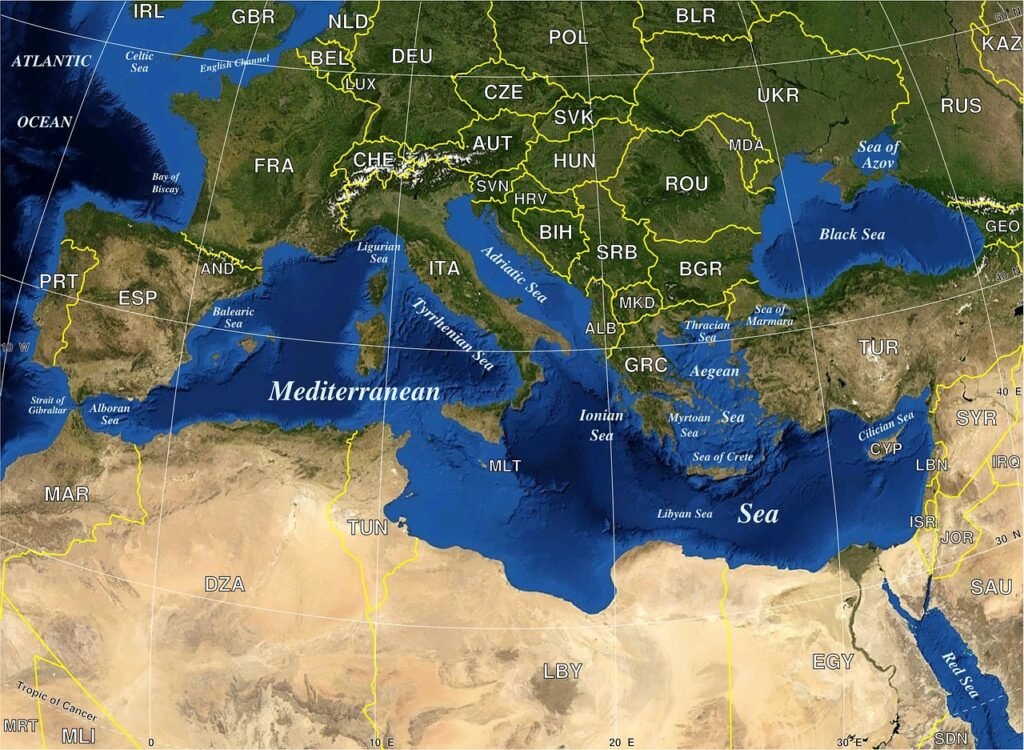
Intro
Have you ever wondered why people from the Mediterranean region tend to live longer and have lower rates of chronic diseases? The secret might lie in their eating habits. The Mediterranean diet is not just a meal plan; it’s a lifestyle that promotes health, longevity, and a sense of well-being. By incorporating fresh fruits, vegetables, whole grains, and healthy fats, the Mediterranean diet offers a holistic approach to eating that is both delicious and nutritious. Whether you’re looking to improve your health or simply explore new culinary traditions, the Mediterranean diet is a fantastic option to consider.
What is the Mediterranean Diet?

The Mediterranean diet draws its inspiration from the traditional eating patterns of countries along the Mediterranean Sea, including Greece, Italy, and Spain.
This diet is a vibrant tapestry of plant-based foods, focusing on a variety of fruits, vegetables, legumes, nuts, and seeds.
At its heart, the diet emphasizes whole grains like oats, barley, and brown rice, and champions olive oil as the primary source of healthy fat.
Olive oil, known for its heart-friendly monounsaturated fats, is a cornerstone of Mediterranean cooking, used generously in everything from salad dressings to sautéing vegetables.
Fish and seafood are fundamental components, offering a rich source of omega-3 fatty acids beneficial for heart and brain health. Salmon, sardines, and mackerel are popular choices.
Poultry, eggs, and dairy products find their place in moderation, ensuring a balanced intake of essential nutrients without over-reliance on any single food group.
Red meat and sweets are reserved for special occasions, making their consumption more mindful and sparing.
One of the distinguishing features of the Mediterranean diet is its focus on enjoying meals with loved ones.
This social aspect not only enriches the dining experience but also promotes mindful eating, which can contribute to better digestion and satisfaction.
Coupled with regular physical activity, this holistic approach nurtures both body and spirit.
The Mediterranean diet also champions the use of herbs and spices to elevate the flavor of dishes naturally.
Think of aromatic basil, oregano, rosemary, and thyme enhancing your meals without the need for excessive salt.
These seasonings not only boost taste but also offer additional health benefits, thanks to their anti-inflammatory and antioxidant properties.
In essence, the Mediterranean diet is more than a nutritional regimen; it’s a lifestyle that prioritizes wholesome, flavorful foods while encouraging physical activity and social connection.
It offers a diverse and delicious way to nourish your body, celebrate the joy of eating, and support long-term health.
By integrating these elements into your daily routine, you embrace a well-rounded and fulfilling way of life.
Health Benefits Backed by Science
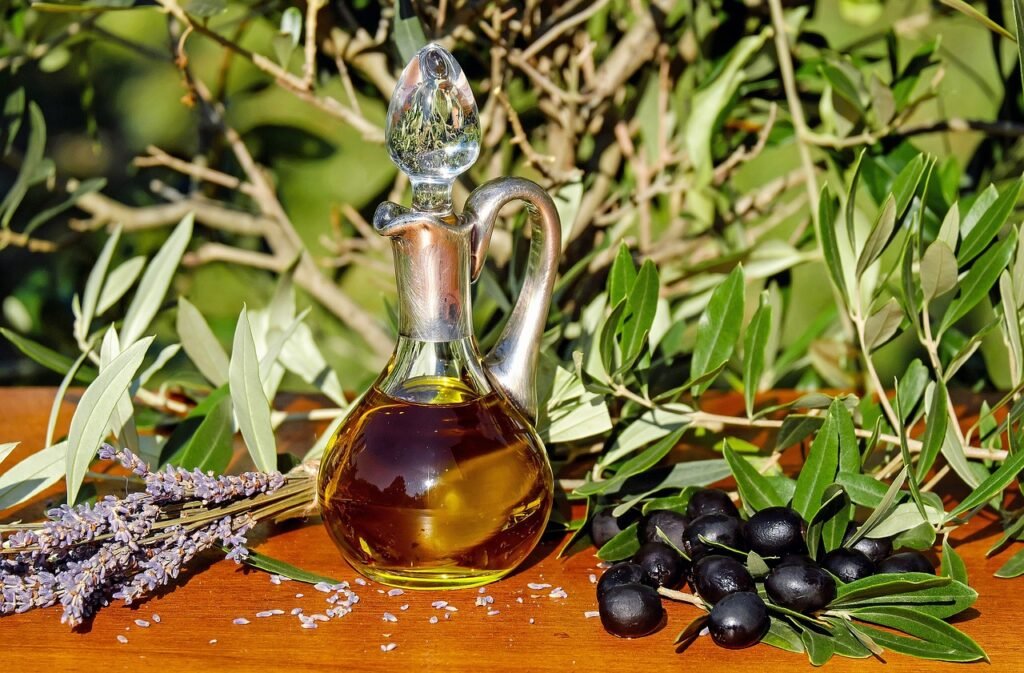
Scientific research continues to affirm the numerous health benefits of the Mediterranean diet, making it a standout choice for those seeking to enhance their well-being.
Notably, researchers have linked this diet to a reduced risk of coronary artery disease (CAD).
Moreover, the Mediterranean diet has been associated with lowering your risk of cardiovascular disease, including a heart attack or stroke.
One key aspect of this diet is its positive impact on various health metrics. Adopting the Mediterranean diet helps in maintaining healthy blood sugar levels, blood pressure, and cholesterol.
This is largely due to its emphasis on whole grains, healthy fats like olive oil, and a generous intake of fruits and vegetables.
These components work together to provide essential nutrients that support metabolic health.
Additionally, the Mediterranean diet is beneficial for cognitive function.
It has been shown to slow the decline of brain function as you age.
Foods rich in antioxidants, such as leafy greens and berries, alongside omega-3 fatty acids from fish, contribute to brain health by reducing inflammation and oxidative stress.
This dietary approach also promotes a balanced and diverse intake of nutrients, which is crucial for overall health.
The focus on plant-based foods, moderate portions of lean proteins, and healthy fats ensures that you’re getting a broad spectrum of vitamins and minerals without overloading on any one type of food.
By following these principles, you can support a healthy immune system and reduce the risk of various chronic conditions.
Another advantage is the diet’s effect on gut health.
The high fiber content from whole grains, legumes, fruits, and vegetables aids in digestion and supports a healthy gut microbiome.
Essential Foods of the Mediterranean Diet
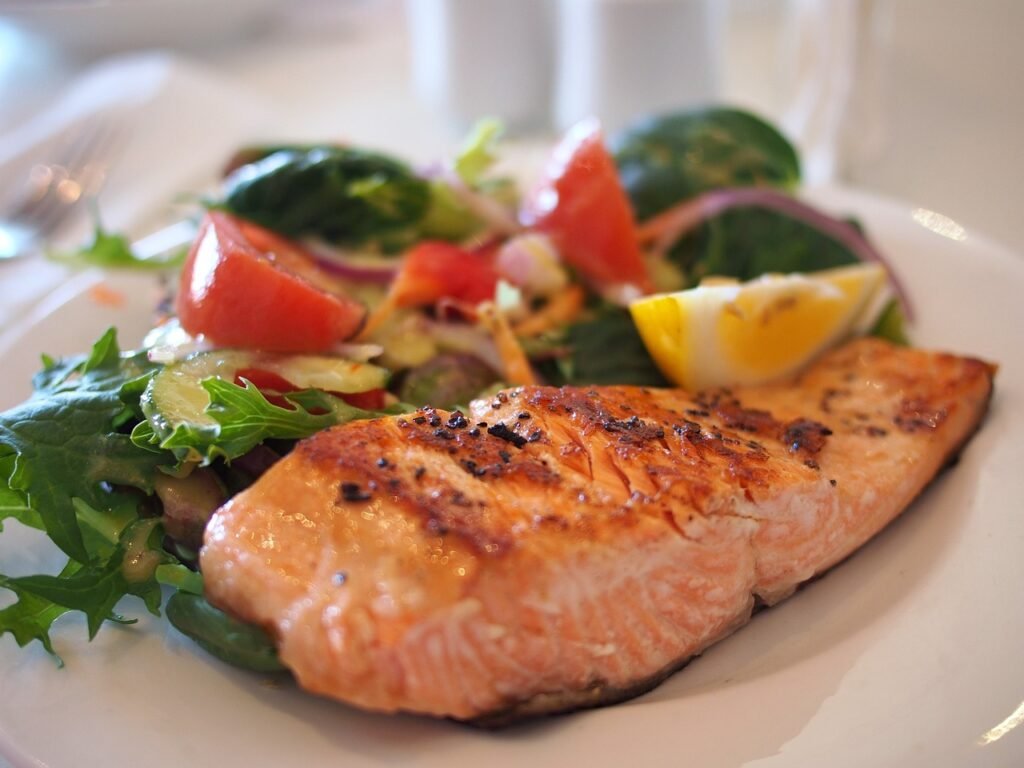
To truly immerse yourself in the Mediterranean diet, it’s essential to focus on its cornerstone foods.
Start by prioritizing an array of fruits and vegetables, which should make up a significant portion of your meals.
These provide essential vitamins, minerals, and fiber, supporting overall health and vitality.
Whole grains are another key component.
Foods like oats, barley, and brown rice are excellent sources of sustained energy and nutrients.
They help keep you satiated longer, reducing the temptation to snack on less healthy options.
Remember, the goal is to choose whole, unprocessed grains whenever possible.
Olive oil, often dubbed “liquid gold,” is a staple in Mediterranean kitchens.
Renowned for its heart-healthy monounsaturated fats, olive oil is versatile—use it in cooking, as a salad dressing, or simply drizzle it over roasted vegetables.
This healthy fat enhances the flavor of your dishes while providing numerous health benefits.
Fish, particularly fatty varieties like salmon, sardines, and mackerel, should be a frequent feature in your diet.
These fish are rich in omega-3 fatty acids, which are crucial for heart and brain health. Aim to include fish in your meals several times a week.
Don’t overlook the power of legumes. Beans, lentils, and chickpeas are excellent sources of plant-based protein and fiber.
They can be used in a multitude of dishes, from soups and stews to salads and dips.
These affordable and nutritious options help diversify your diet.
Nuts and seeds also play a significant role.
Almonds, walnuts, sunflower seeds, and flaxseeds provide healthy fats, protein, and a host of essential nutrients.
They make for great snacks and can be added to salads, yogurt, and oatmeal for an extra nutritional boost.
Herbs and spices are the unsung heroes of the Mediterranean diet.
Fresh and dried herbs like basil, oregano, rosemary, and thyme not only enhance the flavor of your meals but also offer their own health benefits.
These seasonings can reduce the need for added salt, allowing the natural flavors of your food to shine through.
Lastly, while dairy and poultry are included in the Mediterranean diet, they are consumed in moderation.
Opt for yogurt and cheese in controlled portions, and choose lean poultry cuts.
Red meat and sweets are occasional indulgences, reserved for special occasions, which helps keep your diet balanced and nutritious.
By focusing on these essential foods, you’ll be well on your way to embracing the Mediterranean lifestyle and reaping its many health benefits.
Mediterranean Diet Meal Planning Tips
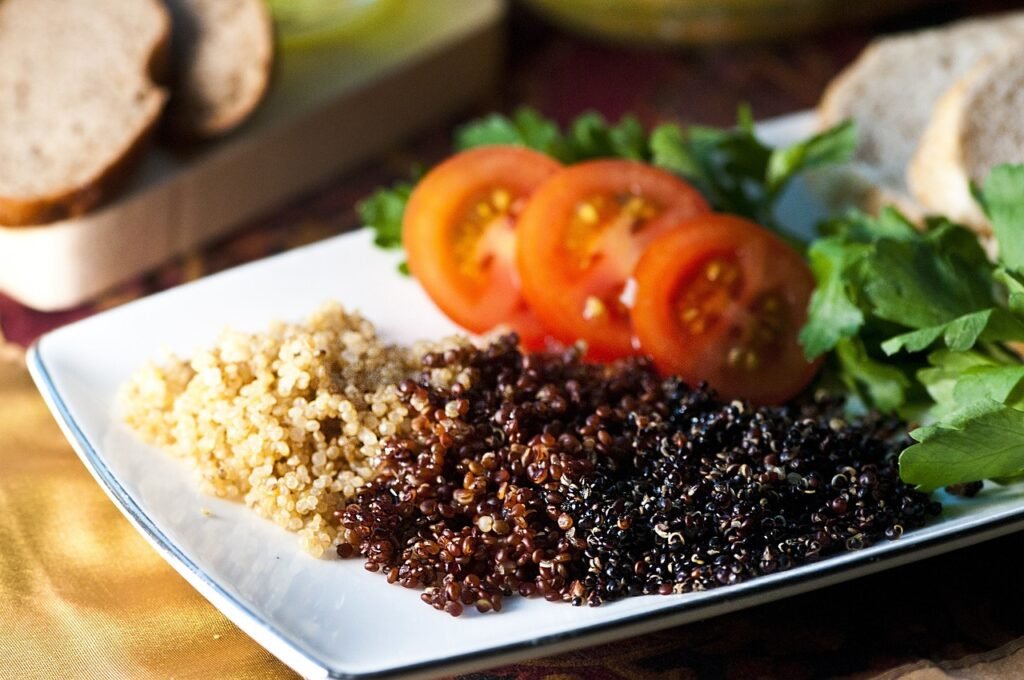
Embracing the Mediterranean diet starts with thoughtful meal planning.
The first step is to stock your kitchen with essential ingredients.
Think olive oil, whole grains like quinoa and barley, canned beans, and a diverse array of herbs and spices.
This foundational pantry will make whipping up Mediterranean dishes a breeze.
When planning your meals, prioritize fresh produce.
Aim to fill half your plate with colorful fruits and vegetables, which not only add vibrancy to your meals but also ensure you get a variety of essential nutrients.
Incorporate leafy greens, tomatoes, bell peppers, cucumbers, and berries into your daily diet.
Make fish and seafood your primary protein source several times a week.
Opt for fatty fish like salmon, sardines, and mackerel to reap the benefits of omega-3 fatty acids.
Not only are these fish delicious, but they’re also incredibly versatile—grill, bake, or sauté them with a drizzle of olive oil and a sprinkle of herbs for a flavorful meal.
Poultry and dairy products can be enjoyed in moderation.
Choose lean cuts of chicken or turkey and incorporate yogurt and cheese in controlled portions.
Use Greek yogurt as a base for dips or as a topping for fruits and cereals. Sprinkle feta or Parmesan over salads for an added burst of flavor.
Don’t forget legumes, which are a powerhouse of plant-based protein and fiber. Beans, lentils, and chickpeas can be used in a variety of dishes from soups and stews to salads and spreads.
These ingredients are not only nutritious but also budget-friendly, making them a staple in Mediterranean meal planning.
For snacks, keep it simple and healthy.
A handful of nuts or a piece of fresh fruit can satisfy your hunger between meals.
Nuts like almonds and walnuts are rich in healthy fats and make for a quick, nutritious snack.
Hydration is key, so opt for water as your primary beverage.
If you enjoy an occasional drink, a glass of red wine can be part of your meal plan, reflecting traditional Mediterranean practices.
Lastly, make your meals visually appealing.
A colorful plate not only looks inviting but also ensures a well-rounded intake of nutrients.
By varying your ingredients and trying new recipes, you’ll keep your meals exciting and nutritious, making the Mediterranean diet a sustainable and enjoyable lifestyle choice.
Delicious and Easy Mediterranean Recipes
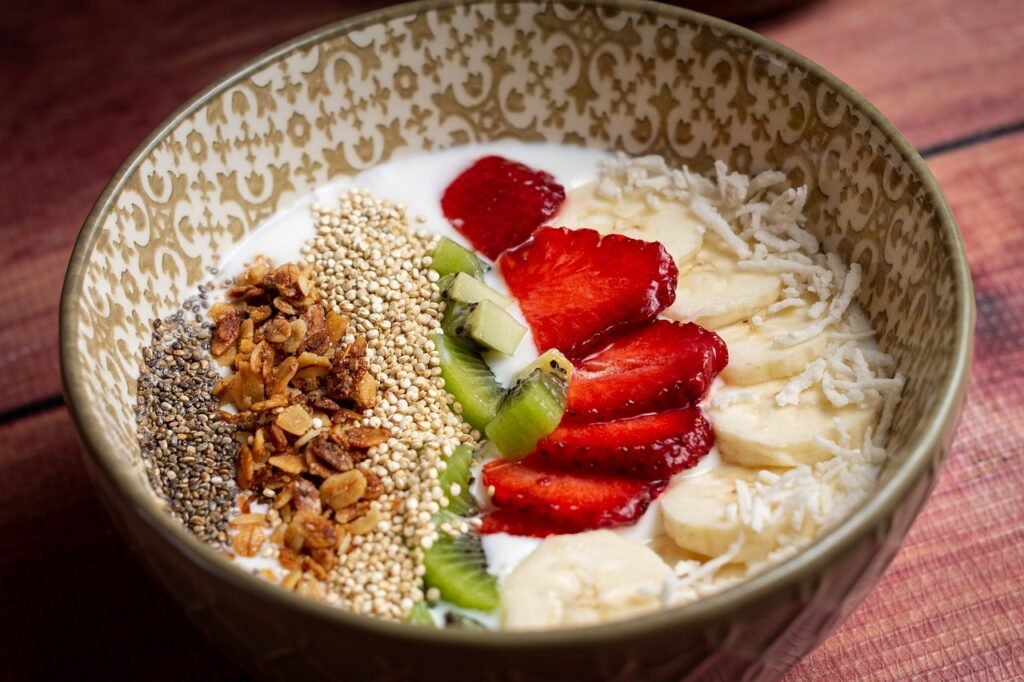
Exploring Mediterranean recipes opens up a world of vibrant flavors and simple, nutritious meals.
Kick off your day with a classic breakfast: Greek yogurt topped with fresh berries, a drizzle of honey, and a handful of crunchy nuts.
It’s a protein-packed start that’s both satisfying and delicious.
For lunch, elevate your midday meal with a Mediterranean salad.
Combine ripe tomatoes, crisp cucumbers, red onions, Kalamata olives, and crumbled feta cheese.
Toss with olive oil and a splash of lemon juice for a refreshing and filling dish. Add a side of whole grain pita for a complete meal.
Dinner can be both effortless and gourmet with dishes like grilled salmon.
Marinate the salmon in olive oil, garlic, and fresh dill before grilling to perfection.
Serve alongside a hearty quinoa salad mixed with cherry tomatoes, cucumbers, and a sprinkle of fresh herbs.
Roasted vegetables, such as bell peppers, zucchini, and eggplant, complement this meal wonderfully, offering a medley of flavors and nutrients.
On cooler evenings, nothing beats the comfort of a Mediterranean stew.
A chickpea and spinach stew with garlic and cumin is not only heartwarming but also brimming with fiber and plant-based protein.
Serve with a slice of whole grain bread to soak up every bit of the savory broth.
Snack time can be equally exciting and nutritious.
Prepare a batch of homemade hummus using chickpeas, tahini, lemon juice, and garlic.
Pair it with fresh vegetable sticks or whole grain crackers for a delightful snack that’s perfect any time of the day.
For a sweet treat, keep it simple yet indulgent.
A small serving of fresh fruit, such as figs, dates, or a slice of watermelon, can satisfy your sweet tooth naturally.
If you’re in the mood for something a bit more decadent, dark chocolate makes for an excellent choice.
Opt for a piece with high cocoa content for maximum health benefits and a rich, satisfying flavor.
Whether you’re hosting a dinner party or just enjoying a quiet meal at home,
these Mediterranean recipes are designed to be both easy to prepare and packed with nutritional benefits.
By incorporating these dishes into your routine, you’ll discover the joy of eating well while nourishing your body with wholesome, delicious foods.
Navigating the Mediterranean Diet on a Budget
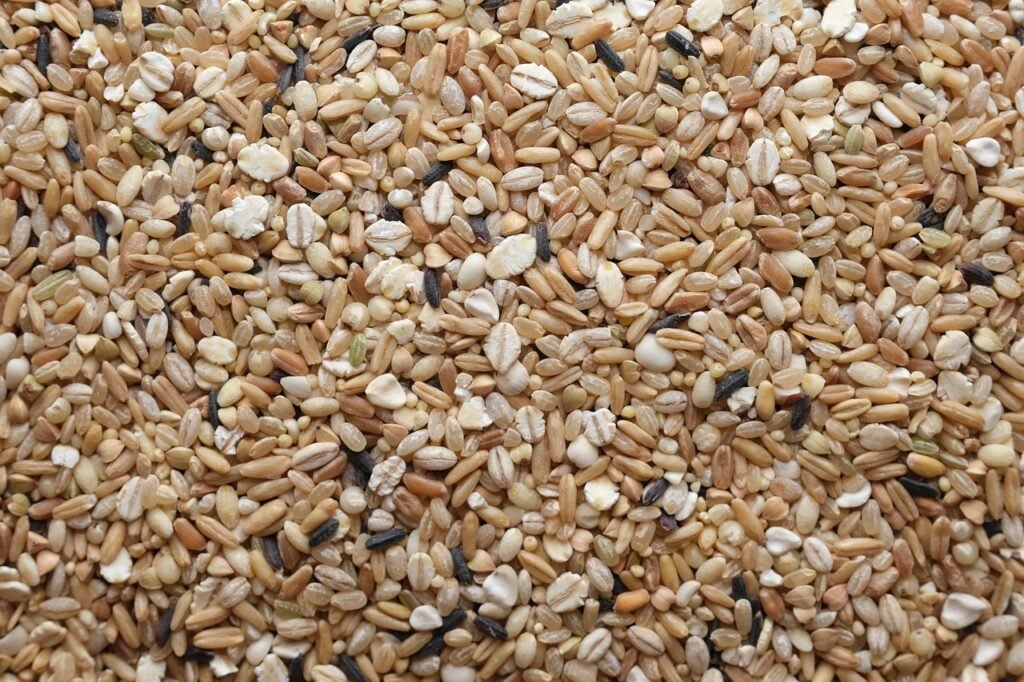
Navigating the Mediterranean diet on a budget is entirely achievable with some strategic planning.
Start by focusing on budget-friendly staples such as beans, lentils, and seasonal produce.
These ingredients are not only cost-effective but also packed with essential nutrients, making them perfect for a nutritious diet.
Buying whole grains like oats, barley, and brown rice in bulk can significantly cut costs while providing a versatile base for many meals.
When fresh produce is expensive or unavailable, turn to frozen fruits and vegetables.
They are often just as nutritious as their fresh counterparts and can be a lifesaver for your wallet.
Canned fish like tuna and sardines are another affordable option, rich in omega-3 fatty acids and easy to incorporate into a variety of dishes.
Plan your meals around sales and discounts at your local grocery store.
This approach allows you to stock up on essential items when they are most affordable.
Consider visiting farmers’ markets, where you might find deals on fresh, local produce that can add variety and flavor to your meals.
Embrace the art of meal prepping to maximize your budget.
By preparing meals in advance, you can avoid the temptation of costly takeout and ensure that you always have a healthy option on hand.
Use leftovers creatively to minimize waste and stretch your food supply further.
For example, you can prepare leftover roasted vegetables for a hearty soup or add them to a grain bowl for a quick, satisfying lunch.
Don’t underestimate the power of herbs and spices to elevate simple ingredients.
A small investment in dried herbs like basil, oregano, and thyme can go a long way in enhancing the flavor of your dishes without adding extra cost.
These seasonings not only make your meals more enjoyable but also contribute additional health benefits.
Lastly, consider incorporating more plant-based meals into your routine.
While fish and poultry are integral to the Mediterranean diet, plant-based proteins like legumes and nuts can be more affordable and just as nutritious.
Experiment with dishes such as lentil stews or chickpea salads to keep your meals interesting and budget-friendly.
By being mindful of your choices and planning ahead, you can enjoy the benefits of the Mediterranean diet without straining your finances.
Expert Support and Resources

Navigating the Mediterranean diet can be an enriching experience, and having access to expert support can make the transition smoother.
Consider consulting with a nutritionist or dietitian who specializes in the Mediterranean diet.
These professionals can offer personalized advice and create meal plans tailored to your specific health goals and dietary preferences.
Books and online resources are invaluable tools for anyone looking to dive deeper into the Mediterranean lifestyle.
Renowned authors and chefs have published cookbooks filled with authentic recipes and practical tips to help you incorporate Mediterranean principles into your everyday cooking.
Websites and blogs dedicated to Mediterranean cuisine provide a treasure trove of recipes, meal plans, and grocery lists, making it easier to stick to your dietary goals.
Joining online communities and forums can also be highly beneficial.
These platforms offer a space for you to share experiences, ask questions, and exchange recipe ideas with others who are also following the Mediterranean diet.
Social media groups and dedicated forums often feature contributions from experts and long-time adherents, providing you with a wealth of collective knowledge.
Mobile apps designed for the Mediterranean diet can serve as handy companions on your culinary journey.
These apps often include features like meal tracking, recipe suggestions, and grocery list generators, all tailored to help you stay on course.
Workshops and cooking classes are another excellent resource.
Many local community centers and culinary schools offer classes that focus on Mediterranean cooking techniques and recipes.
These hands-on experiences can deepen your understanding of the diet and provide practical skills you can use in your kitchen.
For those who prefer a more structured approach, subscription meal services now offer Mediterranean diet plans.
These services deliver pre-portioned ingredients and easy-to-follow recipes straight to your door, simplifying the process of adhering to a Mediterranean diet.
By leveraging these expert resources, you can confidently embrace the Mediterranean lifestyle, knowing that support and inspiration are readily available.
